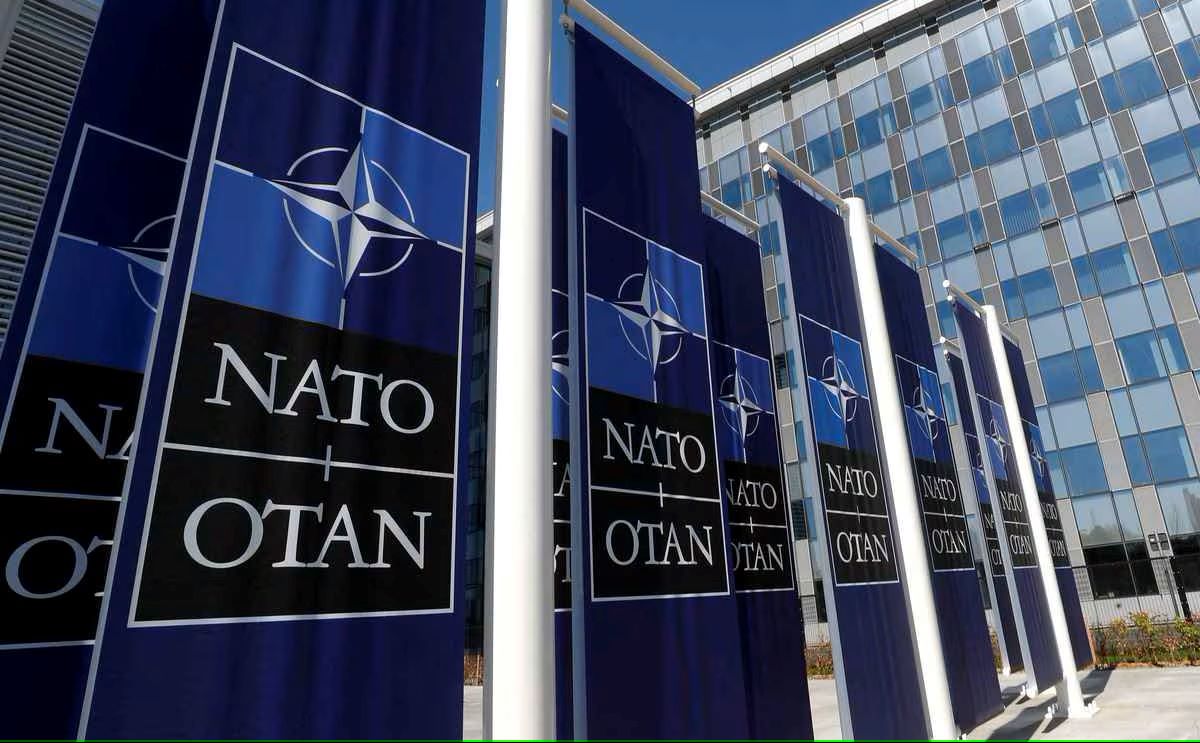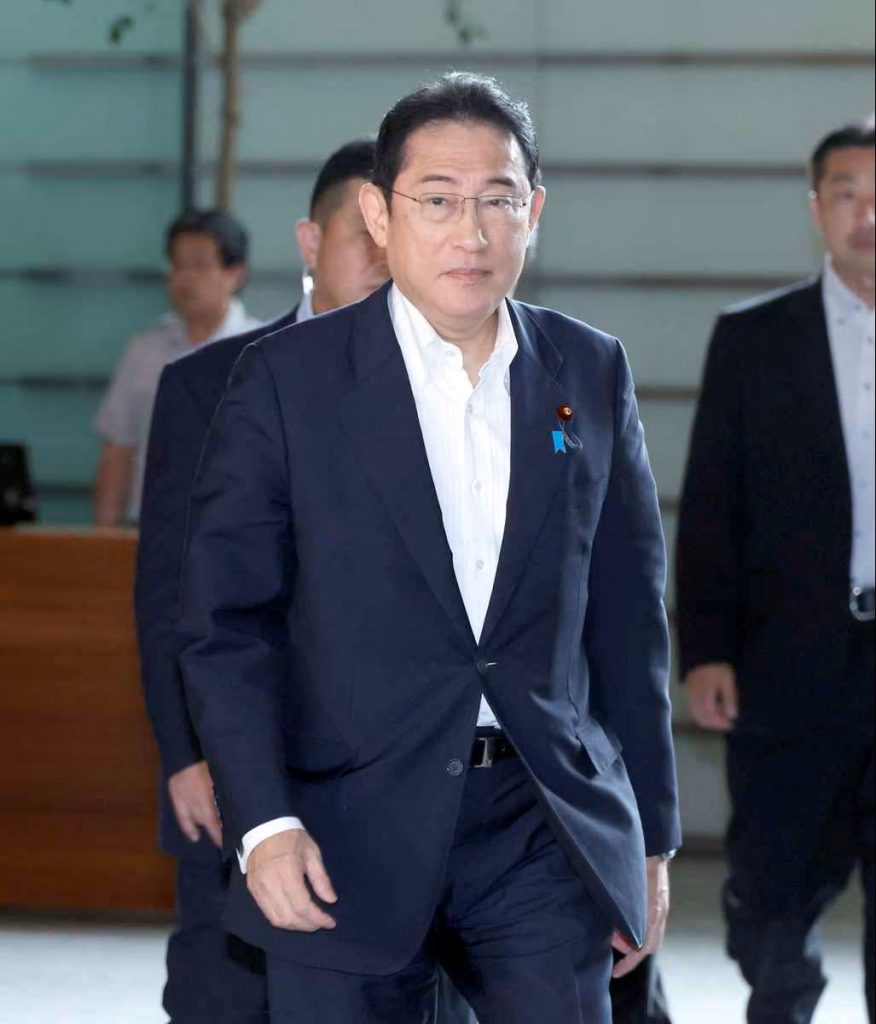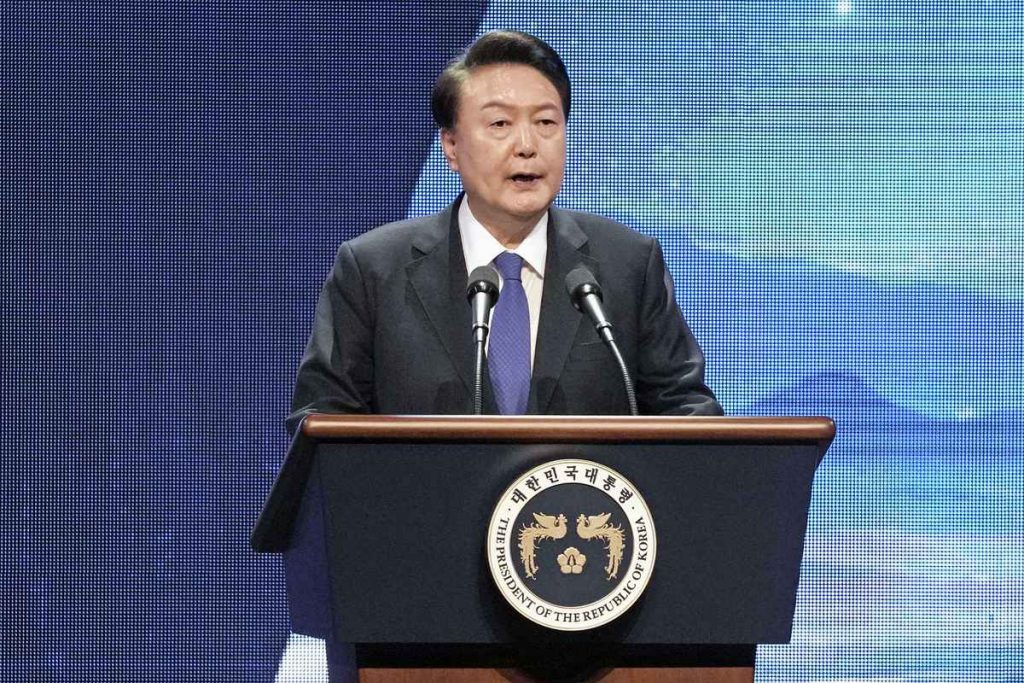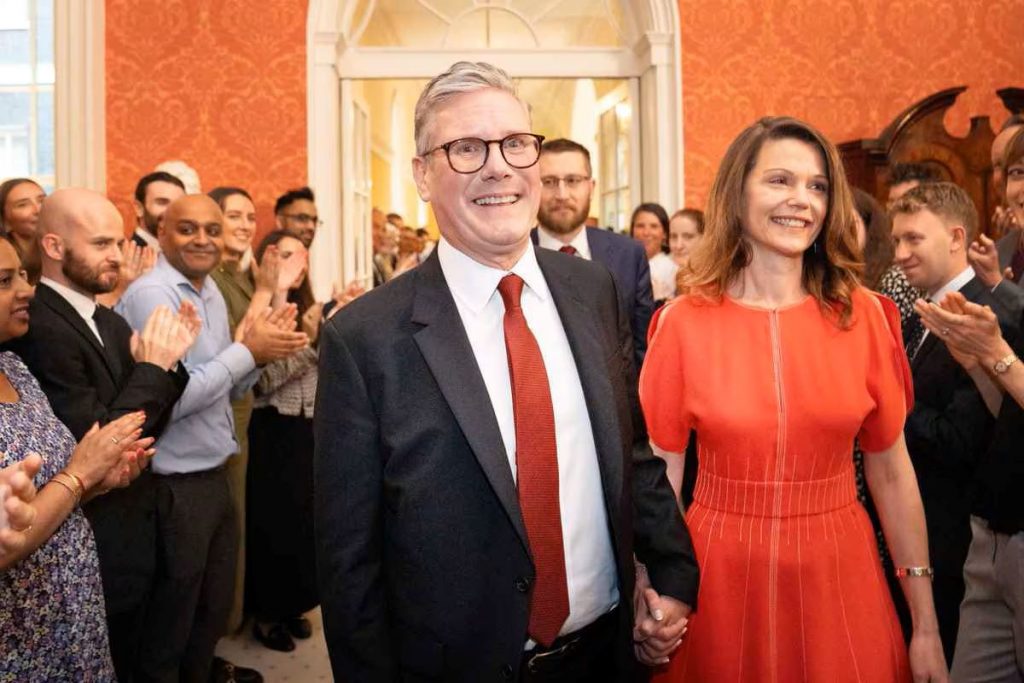NATO in the Indo-Pacific, Where 'East is East…'
While NATO focuses Europe, it is increasingly aware that "tougher strategic competition in the Indo-Pacific could have a direct impact on European security."
July 11, 2024
By Jim Przystup

A banner at the entrance to the NATO headquarters in Brussels, Belgium (©Reuters)
"East is East and West is West and never the twain shall meet," wrote Rudyard Kipling in 1892. That was then, this is now. The AP4, Japan, the Republic of Korea, Australia, and New Zealand are now participating for the third time at a North Atlantic Treaty Organization (NATO) Summit.
How did this come about? Not by accident. But thanks to the catalytic roles played by the "no limits" partners, Vladimir Putin and Xi Jinping, with a supporting cast of Kim Jong Un and the Mullahs in Teheran.
"East is East and West is West and never the twain shall meet," wrote Rudyard Kipling in 1892. That was then, this is now. The AP4, Japan, the Republic of Korea, Australia, and New Zealand are now participating for the third time at a North Atlantic Treaty Organization (NATO) Summit.
How did this come about? Not by accident. But thanks to the catalytic roles played by the "no limits" partners, Vladimir Putin and Xi Jinping, with a supporting cast of Kim Jong Un and the Mullahs in Teheran.

Prime Minister Fumio Kishida enters the Prime Minister's Office on July 9. (©Sankei by Ataru Haruna)
A Pivotal Quad meeting
At the video Quad meeting of March 3, 2022, Quad leaders met to discuss the international crisis brought about by Russia's invasion of Ukraine. They also discussed the possible spillover effects of the European crisis on stability and security in the Indo-Pacific. Their joint statement reaffirmed their commitment to "a free and open Indo-Pacific in which the sovereignty and territorial integrity of all states is respected and countries are free from military, economic and political coercion."
Following the meeting, Prime Minister Kishida added "We've agreed that changes in the status quo, like this (Russia's invasion of Ukraine) should not be allowed in the Indo-Pacific region."
At the same time, Liz Truss then UK Foreign Secretary told the Atlantic Council in Washington, DC, "Conflict anywhere threatens security everywhere. The Euro-Atlantic and the Indo-Pacific are indivisible." Standing together, the UK, the United States, the G7, the European Union, Canada and Japan "will face down aggression around the world – from the South China Sea to Eastern Europe."
Speaking during his July 2023 visit to Ukraine, President Yoon Suk-yeol observed: "War in Ukraine has reminded us all that a security crisis in one particular region can have a global impact."
From Indo-Pacific allies, dollars and defense equipment have flowed to Ukraine.
Japan's Engagement in Ukraine
Underscoring Japan's commitment, Prime Minister Fumio Kishida also traveled to Ukraine. On March 21 2023, Kishida visited Bucha, met with President Volodymyr Zelenskyy, and invited him to attend the G7 Summit in Hiroshima. Japan's financial support for Ukraine since the Russian invasion has totaled more than $12 billion USD.
Japan has also provided Ukraine with non-lethal defense equipment. Since the invasion, Japan has provided bulletproof vests, helmets, mine detection equipment, and technical training. It has given humanitarian and reconstruction assistance as well.
In December 2023, the Kishida government amended Japan's arms export control law to allow the export of Patriot missile systems to the United States. That allowed the United States, in turn, to supply Ukraine from its stock of Patriot missiles. And, at the June 2024 G7 Summit in Italy, Japan and Ukraine concluded a long-term bilateral security agreement, committing to consultations should Russia again attack Ukraine.
Underscoring Japan's commitment, Prime Minister Fumio Kishida also traveled to Ukraine. On March 21 2023, Kishida visited Bucha, met with President Volodymyr Zelenskyy, and invited him to attend the G7 Summit in Hiroshima. Japan's financial support for Ukraine since the Russian invasion has totaled more than $12 billion USD.
Japan has also provided Ukraine with non-lethal defense equipment. Since the invasion, Japan has provided bulletproof vests, helmets, mine detection equipment, and technical training. It has given humanitarian and reconstruction assistance as well.
In December 2023, the Kishida government amended Japan's arms export control law to allow the export of Patriot missile systems to the United States. That allowed the United States, in turn, to supply Ukraine from its stock of Patriot missiles. And, at the June 2024 G7 Summit in Italy, Japan and Ukraine concluded a long-term bilateral security agreement, committing to consultations should Russia again attack Ukraine.

South Korean President Yun Seok-yeol on June 25 (©Kyodo)
South Korea Follows Suit
Like Prime Minister Kishida, President Yoon visited Ukraine in July 2023. The Republic of Korea, while maintaining its policy of not providing weapons to countries actively engaged in hostilities, has transferred over 100,000 artillery rounds to the United States. That allowed the United States, in turn, to supply Ukraine from its stocks replenished by South Korea.
South Korea also supplied Ukraine with non-lethal defense equipment. For example, body armor, helmets, and de-mining equipment. Humanitarian assistance to Ukraine totaled $150 million in 2023, up from $100 million in 2022.
At the same time, President Yoon signaled that South Korea's support for Ukraine could move beyond humanitarian and financial assistance. In an April 2024 interview with Reuters, Yoon said, "If there is a situation the international community cannot condone, such as any large-scale attack on civilians, massacre or serious violation of the law of war, it might be difficult for us to insist only on humanitarian or financial support."
Australia and New Zealand
Elsewhere in the Indo-Pacific, in April 2024, Australia's Deputy Prime Minister Richard Marles traveled to Ukraine. There, he announced a new $100 million military support package ー $50 million for short-range air defense systems, $30 million for unmanned drones, and $15 million for helmets and other defense equipment. The new package brings Australia's military support for Ukraine to $880 million and total support to over $1 billion.
And New Zealand likewise has pledged over $100 million to support Ukraine since Russia's invasion. That includes $77 million for military training and equipment.
It has deployed 97 defense personnel to Europe to assist in the training of Ukrainian forces. It provided another $21.93 million in humanitarian assistance. Along with those, it pledged $5.2 million to support human rights monitoring and legal processes.
Europe in the Indo-Pacific
Even as Russia's invasion of Ukraine moved to advance Indo-Pacific engagement with Europe, the Euro-Atlantic community has been moving toward greater engagement in the Indo-Pacific.
Over the past half-decade, European security documents all focus on the importance of stability in the Indo-Pacific to European security and prosperity. They highlight the mounting challenges posed by China to the regional order in the Indo-Pacific and to the broader rules-based international system. In order, they are the French Indo-Pacific Strategy, 2018; Germany's Policy Guidelines for the Asia-Pacific, 2020; the Netherlands' Indo-Pacific Guidelines, 2020; the European Union's Strategy for Cooperation in the Indo-Pacific, 2021; and the UK's Integrated Review Refresh, 2023.

British Prime Minister Keir Starmer, NATO's newest head of state, and his wife enter Downing Street on July 5 in London. (©Stephan Rousseau/PA/Kyodo)
UK 'Tilt' Toward Asia
The UK in its 2021 Integrated Review of Security, Defense, Development and Foreign Policy announced a "tilt" toward deeper engagement with the Indo-Pacific and a commitment to established a "persistent presence" in the region. This was underscored by the deployment of HMS Queen Elizaeth carrier strike group to the region.
Two years later, in 2023, The UK's Strategic Review Refresh noted: "Tensions in the Indo-Pacific are increasing and conflict there could have global consequences greater than the conflict in Ukraine."
In his forward to the Refresh, Prime Minister Sunak wrote "Russia's illegal invasion of Ukraine…combined with China's more aggressive stance in the South China Sea and the Taiwan Strait, are threatening to create a world define by danger, disorder and division ー and an international order more favorable to authoritarianism."
Also in January 2023, the UK signed a reciprocal access agreement with Japan to facilitate defense cooperation. The Prime Minister's press office referred to the agreement as "The most important defense treaty between the UK and Japan since 1902." That date refers to the signing of the Anglo-Japanese Alliance.
In expanding Indo-Pacific engagement, the UK has also joined with the United States and Australia in the AUKUS strategic partnership. Likewise, it is cooperating with Italy and Japan in the development of the 6th generation fighter aircraft.
France's Pacific Strategy
France's Defense Strategy toward the Indo-Pacific assessed that "The scale of China's action and ambitions redefines a whole set of balances and military relations in the Indo-Pacific." The strategy encouraged European partners "to get more involved in this region where they have interests." It warns that "tougher strategic competition in the Indo-Pacific could have a direct impact on European security. "
France subsequently joined with Australia in an agreement to strengthen defense cooperation. Under it, they would provide mutual support for deployments as well as operational engagement and intelligence sharing. With Japan, France also agreed to a new series of joint exercises in response to challenges in the South China Sea.
British, French, Germany and Dutch navies have deployed naval vessels to the Indo-Pacific. They are engaged in training with regional counterparts with a view toward enhancing interoperability.
NATO's Broadening Focus
The 2024 NATO Summit makes the security focus of NATO and individual European allies clear. Its attention will, for the foreseeable future, remain on the challenges posed by Putin and the on-going conflict in Ukraine. But the growing diplomatic and security engagement with the Indo-Pacific can have significant normative value and enhance diplomatic deterrence. In particular, NATO's stated opposition to the use of force or coercion to change the status quo.
As Prime Minister Kishida observed during his 2023 Summit meeting with President Marcon, "From now on, the security of Europe and that of the Indo-Pacific are inseparable."
Secretary of State Antony Blinken also recently noted that "Increasingly partners in Europe see challenges halfway around the world as being relevant to them, just as partners in Asia see challenges halfway around the world in Europe as being relevant to them."
The Twain have met.
RELATED:
Possible NATO Invitation for Kishida as Biden Seeks Regional Cooperation
Author: James J Przystup
Senior Fellow, Japan Chair, The Hudson Institute
No comments:
Post a Comment